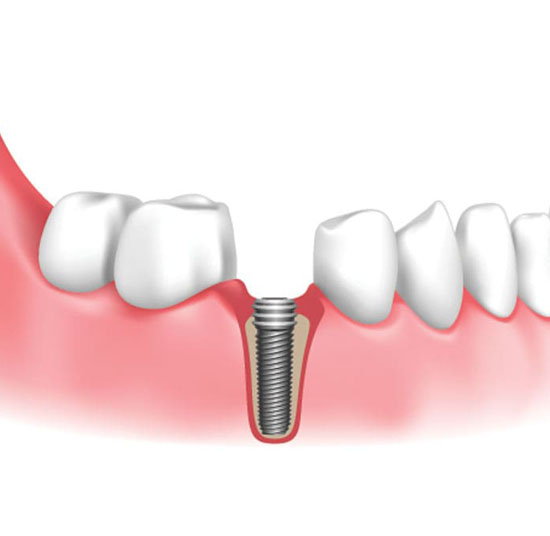
Implantology
There’s a reason dental implants are quickly becoming the most popular treatment for missing teeth, and that’s because the results are stunning. At New Britain & Jenkintown Dental Associates, we carefully diagnose and plan every implant procedure to ensure each one results in a natural-looking and comfortably fitting tooth restoration.
Our dental implants provide a strong foundation to replace missing teeth and provide results that look and feel natural.
What is a Dental Implant?
A natural tooth has two main components: The crown and the root. The crown is the visible part of the tooth and the root is located below the gumline, in the bone of the jaw.
Implantology is the branch of dentistry dedicated to dental implants. The dental implant is an artificial tooth root that is inserted into the jawbone (either the maxilla or the mandible). It often takes the form of a screw that is composed of titanium or titanium alloy.
Dental implants can be considered for patients who are missing one or more teeth. A dental implant alone does not replace a natural tooth. An abutment must be mounted on the implant once the latter has been inserted into the jawbone and given time to heal. Depending on the number of teeth to replace, an artificial crown, a full or partial denture, or a bridge will be prepared and installed on the abutment(s). If the patient only has one missing tooth, a single crown will be sufficient. If several teeth need to be replaced, many options are available: using a single implant with multiple crowns joined by a bridge or a prosthesis, or using multiple implants with distinct crowns. This choice is up to the patient, according to the treatment plan recommended by our doctor.
How Does it Work?
To begin the implant process, a metal post is surgically positioned into the jaw. This post will act as a permanent “root” for the implanted tooth. Once it is in place and the surrounding bone and tissue have healed, the restoration is completed with a beautiful restoration (often a crown) that looks, acts and feels like a natural tooth.
Benefits of Dental Implants
Comfort - Because they become part of you, implants eliminate the discomfort of removable dentures.
Appearance - Dental implants look and feel like your own teeth. Because they are designed to fuse with bone, they become permanent.
Oral Health - Implants don’t require reducing other teeth like a tooth-supported bridge. Because nearby teeth are not altered to support the implant, more of your own teeth are left intact, improving oral health.
Speech - With poor-fitting dentures, the teeth can slip within your mouth, causing you to mumble your words. Dental implants allow you to speak without the worry that teeth might slip.
Types of Dental Implants
Replace Single Tooth - The single tooth implant is placed by surgery in the upper or lower jaw, where it replaces your missing tooth’s root(s).
Implant Bridge - An implant-supported bridge is similar to a regular dental bridge, but it is supported by implants and not by natural teeth.
Snap In Dentures - Implant-supported dentures held in place not just by the gums, but by either a few remaining teeth or by metal posts that are implanted in the jawbone.
All-On-4 Implants - Four implants support a fixed prosthesis with 10 to 14 teeth and it is placed immediately, typically within 24 hours of surgery.
Am I a Good Candidate for Dental Implants?
Missing teeth can make talking, chewing and even smiling difficult. If you’re ready for a full, functional smile, you may be a perfect candidate for dental implants — a permanent and stable solution to missing teeth. Thanks to leading technology, more and more patients are qualifying for dental implant placement. Good candidates include patients who:
- Are missing one or more teeth
- Are looking for a permanent solution
- Want results that look and feel natural
- No longer want or cannot wear dentures
- Have adequate structure in their jawbone
- Have healthy oral tissues
- Want to improve speech and function
- Can commit to several months of treatment
